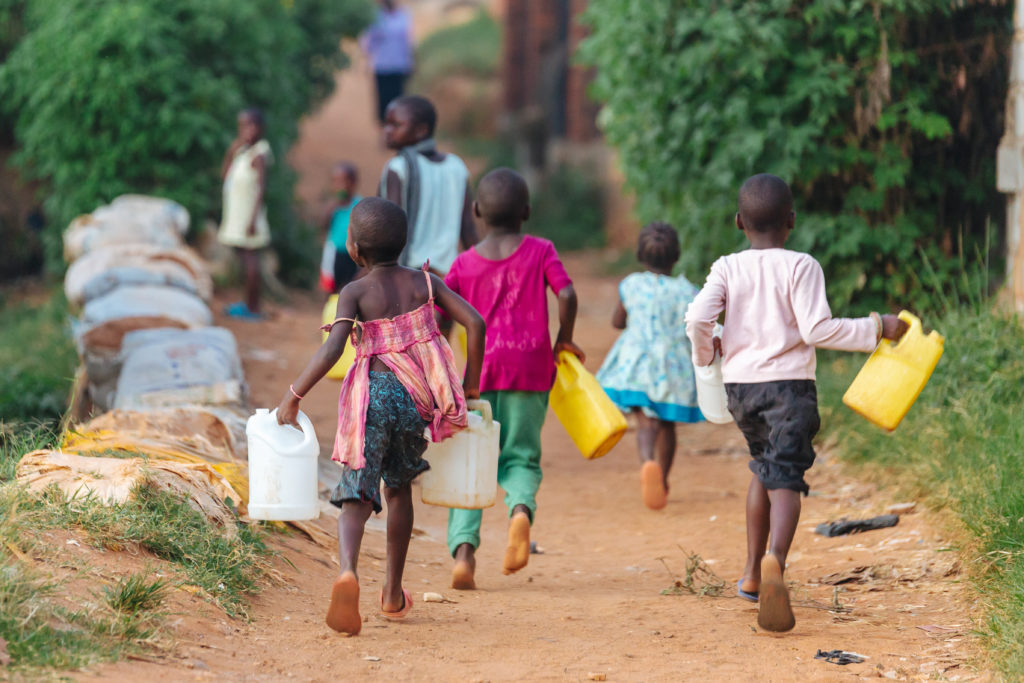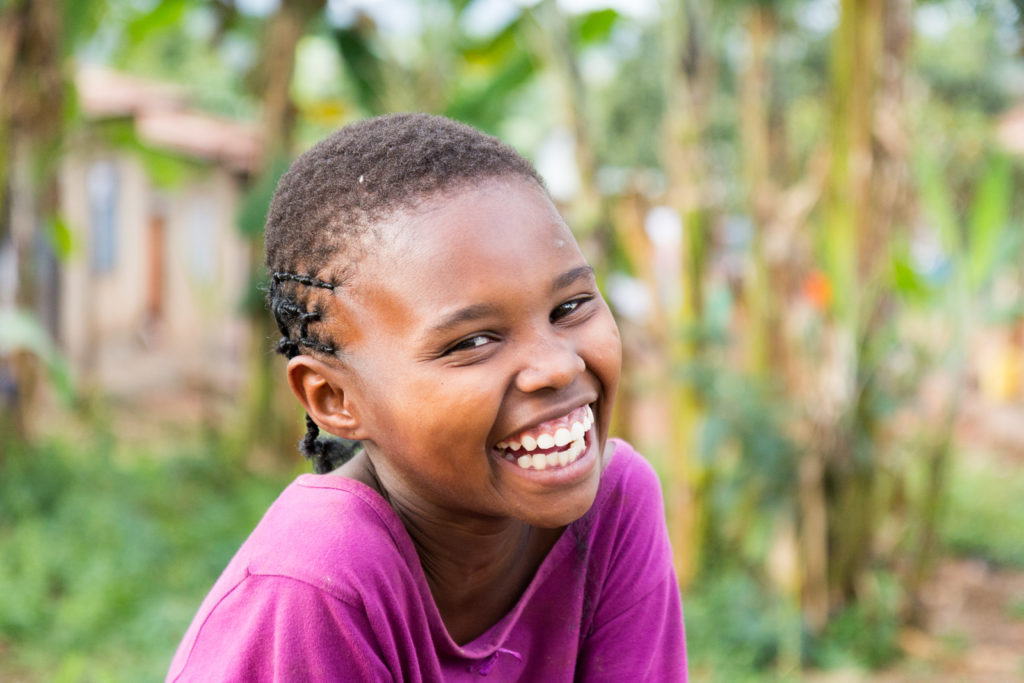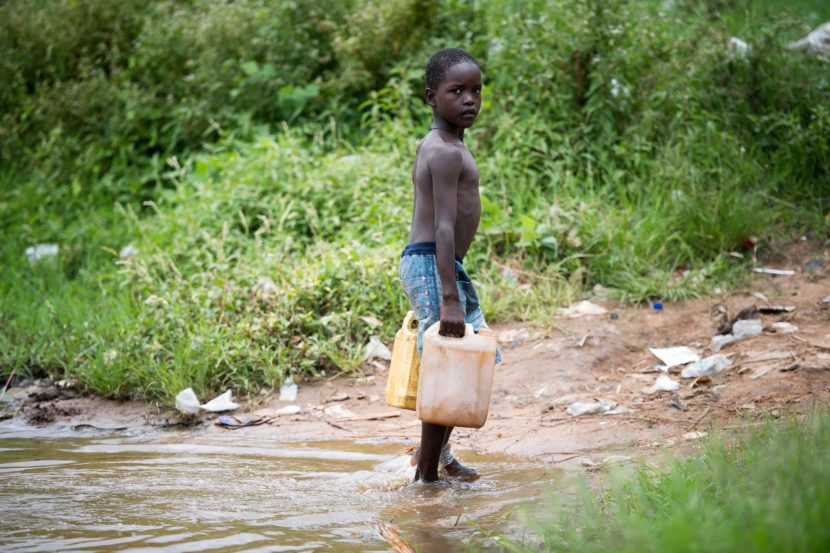As part of one of the projects led by the French company TotalEnergies, it was agreed to build a colossal 1,443 km pipeline between Uganda and Tanzania through which crude oil is to be transported. The pipeline would lead to the port of Tanga, Tanzania, for subsequent export to various parts of the world. Despite being presented by its officials as a hopeful project that promises solid economic growth at the national level in Uganda and Tanzania, humanitarian, environmental, and social justice issues terrify the local and global population, including children.
From crude oil finding to controversial exploitation
Following the finding of crude oil in 2006 in western Uganda, national and international efforts have been undertaken to exploit it (FIDH, 2020, p. 6). The French company TotalEnergies is one of the leading companies in charge of carrying out two large-scale projects: the Tilenga and East African Crude Oil Pipeline (EACOP) (TotalEnergies, 2023).
The EACOP project involves the construction of a 1,443 km pipeline that would transport heated crude oil to the Tanzanian coast for further refining and exporting (Human Rights Watch (HRW), 2023, p. 11) – thus setting a new energy boundary. The project itself is controversial because it compromises, among others, communities, ecosystems, biodiversity, and livelihoods, resulting in immediate and imminent damage.
This was presented as an opportunity for progress for Ugandan and Tanzanian families: job opportunities, improved living conditions, and provision of goods and services (The Guardian, 2021) (Al Jazeera, 2023). Yet, these appear not to be capitalized on to date.
The infrastructure construction plan has already been launched and with it, the land acquisition program. In 2022, the NGO Les Amis de la Terre France issued a report denouncing that, at an early stage of the project, a significant number of people have been affected due to a number of human rights violations (Les Amis de la Terre France, 2022).
The families, drowning in uncertainty, denounced the deprivation of access to their land and with it, the economic activities that require the use of the land (Les Amis de la Terre France, 2022, p. 18-21). The authorities in charge of the project apparently planned rapid compensation in observance of international standards (Les Amis de la Terre France, 2022, p. 19). In most cases, however, compensation was delayed by 3 to 5 years and then became insignificant due to inflation (Les Amis de la Terre France, 2022, p. 15).
Other reports from watchdog NGOs have confirmed these and other rights violations. One of the most recent is from the NGO HRW, which, through a report based on interviews with locals, confirmed what Les Amis de la Terre denounced in 2022 – the land acquisition process continues to negatively impact many households located in the affected areas (HRW, 2023, p. 14).
Dire impacts on children’s rights
The deprivation of access to their land – the primary source of subsistence for these families – triggers social and cultural issues, thus generating a vicious circle of violations, not only with respect to adults but also with respect to children’s rights.
Many are the consequences that this particular scenario can trigger, for instance food insecurity, the child may experience malnutrition; extreme poverty, due to the loss of employment and income of adults, negatively affecting the child’s quality of life; poor health, weakening the immune system of the children; child labor, the lack of income may force children to drop out of school and finally focus on what is immediately urgent; vulnerability to abuse, exploitation, and violence; and as mentioned above, school dropout.
Households located in the affected areas have approximately more than 10 children per dwelling (HRW, 2023, p. 17). Despite containment plans, families are reportedly suffering from food shortages and some limited access to drinking water (Les Amis de la Terre France, 2022, p. 20-21). This information is reiterated in the HRW report, which, one year later, denounces that there are still families who continue to suffer (HRW, 2023, p.39).

Another striking claim in the HRW report is the deprivation of the right to education of children (HRW, 2023, p. 24). The deprivation of access to land caused an unbalance in the lives of families to such an extent that some parents were forced to register their children in schools with lower fees, and other children were simply forced to drop out of school to engage in paid activities (HRW, 2023, p. 25-26). Indeed, HRW recorded a total of 37 cases among 17 families where children dropped out of school (HRW, 2023, p. 25-26).
Far-reaching environmental consequences
The EACOP project is particularly controversial due to the fact that it is oriented to pass through a significant number of natural reserves, natural parks, and streams, disturbing diverse ecosystems. Overall, the population located in the region relies mostly on streams, lakes, and wells as a source of water – consuming it in many cases with limited or no treatment at all (FIDH, 2020, p. 8).
To cite a few specific examples, Murchison Falls National Park is home to about 144 species of mammals, which would be at risk from this project (RFI, 2023). As an already touristic place, it is feared that this project will multiply the number of visitors and, consequently, threaten the ecosystem of the national park (FIDH, 2020, p. 8).
Africa’s seventh-largest lake: Lake Albert, is currently the largest contributor to Uganda‘s fishing industry, supporting approximately 43% of the country’s fisheries (HRW, 2023, p. 14). It would also be altered in its biodiversity because of the oil extraction, distribution, and exporting projects, according to experts (The Oxford Institute for Energy Studies, 2015, p. 36) (FIDH, 2020, p. 7).
The disturbance of Lake Victoria Basin – one of the main reservoirs of the Nile River and the second-largest freshwater lake in the world – could have an impact on around 40 million people who currently depend on it (Les Amis de la Terre France, 2022, p. 29) (HRW, 2023, p. 14).
Climate crisis: intergenerational equity
According to an expert assessment, the project will generate 379 million tons of climate-heating pollution – more than 25 times the combined annual emissions of Uganda and Tanzania (The Guardian, 2022) (Climate Accountability Institute, 2022). Excessive carbon use means that today’s children, will be faced with a much more rapid ramp-up of low-carbon energy and, consequently, will suffer both transient and long-term economic impacts (Aoife Daly, 2022, p. 5) (IPCC, 2014, p. 12).
Intergenerational equity, as a core element of the principle of sustainability, becomes relevant in this context as it underscores the need to ensure that the exploitation of natural resources for the benefit of the present does not deteriorate the quality of life and livelihoods of future generations (Rubin, Alfred P., 1992, p. 173). This serves as a reminder of the responsibility to maintain a balance between economic development and environmental preservation.
Climate change and the disruption of biodiversity cause harmful effects that, in the long term will disrupt the lives of children for years to come (Report of the Special Rapporteur, 2018, para. 69). There are numerous rights recognized in the Convention on the Rights of the Child (CRC) and elsewhere that are already being affected today, including the right to a healthy environment, health, protection, well-being, information, participation (CRC, 1989).
Exploring strategies to address the situation
It is well known that States have an obligation to respect, protect and ensure the human rights of individuals. Even more so, they have an obligation to protect children from environmental harm by ensuring that their best interests are a primary consideration in all decisions that may cause them harm, including through the regulation of private actors such as business enterprises (Report of the Special Rapporteur, 2018, para. 59).
The transition from fossil logic to green energy alternatives will not be immediate or easy. However, it is imperative in order to address climate change and move towards a more sustainable future. It is essential to recognize that this requires collective actions and not just individual or skewed efforts.
The Ugandan and Tanzanian governments have a responsibility to ensure that any economic development is managed in a sustainable manner, ensuring that what could be considered as current revenue does not translate into irreparable losses for future generations.
In effect, state policies and actions play a key role in the global effort to mitigate climate change. Ugandan and Tanzanian states must adhere to internationally set targets. Tax incentives could be an alternative for companies and individuals to invest in green energy projects.
Also, to promote this transition, effective enforcement mechanisms are crucial, and the role of citizens and watchdog NGOs is vital in this process.

As an NGO focused on the well-being of children worldwide, Humanium strongly condemns the violation of children’s rights to a healthy environment. Humanium continues to work to raise awareness of the rights of children. For this purpose, we appeal to the collaboration of those who identify themselves with the cause. If you would like to support our cause, please consider donating, sponsoring, or volunteering in projects which Humanium is currently implementing.
Written by Camila Ortiz Britez
Bibliography:
Al Jazeera (2023) ‘How will a major oil project change East Africa’. Obtained from Al Jazeera at https://www.youtube.com/watch?v=ieKoUcxBrB8, accessed on 16 August 2023.
BBC News Africa (2021) ‘What you need to know about the Uganda-Tanzania $3.5bn oil deal’. Obtained from BBC News Africa at https://www.youtube.com/watch?v=EX97EIilNXY&pp=ygUMZWFjb3AgdWdhbmRh, accessed on 16 August 2023.
Climate Accountability Institute (2022) ‘East Africa Crude Oil Pipeline: EACOP lifetime emissions from pipeline construction and operations, and crude oil shipping, refining, and end use’ by Richard Heede’. Obtained from Climate Accountability Institute at https://climateaccountability.org/wp-content/uploads/2022/10/CAI-EACOP-Rptlores-Oct22.pdf, accessed on 16 August 2023.
Convention on the Rights of the Child (1989) UN Doc. 1577 UNTS 3. Obtained from UN website at https://www.ohchr.org/en/instruments-mechanisms/instruments/convention-rights-child, accessed on 15 August 2023.
Daly, Aoife (2022) ‘Intergenerational Rights are children’s rights: Upholding the right to a healthy environment through the UN Convention on the Rights of the Child’. Obtained from SSRN at https://papers.ssrn.com/sol3/papers.cfm?abstract_id=4141475, accessed on 16 August 2023.
Human Rights Watch (2023) ‘“Our Trust is Broken” Loss of Land and Livelihoods for Oil Development in Uganda’. Obtained from Human Rights Watch at https://www.hrw.org/report/2023/07/10/our-trust-broken/loss-land-and-livelihoods-oil-development-uganda, accessed on 14 August 2023.
International Federation for Human Rights (FIDH) (2020) ‘New Oil, Same Business? At a Crossroads to Avert Catastrophe in Uganda’. Obtained from FIDH at https://www.fidh.org/IMG/pdf/fidh__fhri_report_uganda_oil_extraction-compresse.pdf, accessed on 14 August 2023.
Intergovernmental Panel On Climate Change (IPCC) ‘Climate Change 2014. Synthesis Report. Summary for Policymakers’. Obtained from IPCC at https://www.ipcc.ch/site/assets/uploads/2018/02/AR5_SYR_FINAL_SPM.pdf, accessed on 16 August 2023.
Les Amis de la Terre France (2022) ‘EACOP. A DISASTER IN THE MAKING’. Obtained from Les Amis de la Terre France at https://www.amisdelaterre.org/wp-content/uploads/2022/10/eacop-a-disaster-in-the-making-foe-france-and-survie-oct-2022.pdf, accessed on 14 August 2023.
RFI News (2023) ‘Total’s contested oil projects in Africa: The case of Uganda and Tanzania’. Obtained from RFI News at https://www.rfi.fr/en/africa/20230201-total-s-contested-oil-projects-in-africa-the-examples-of-uganda-and-tanzania, accessed on 16 August 2023.
Rubin, A. P. (1992) ‘Review work: In Fairness to Future Generations: International Law, Common Patrimony, and Intergenerational Equity, by E. B. Weiss’. Obtained from Jstor at https://www.jstor.org/stable/45290085?read-now=1&seq=2, accessed on 16 August 2023.
The Guardian (2021) ‘No power to stop it: optimism turns to frustration over east African pipeline’. Obtained from The Guardian at https://www.theguardian.com/environment/2021/nov/07/no-power-to-stop-it-optimism-turns-to-frustration-over-east-africa-pipeline, accessed on 16 August 2023.
The Guardian (2022) ‘‘Monstrous’ east African oil project will emit vast amounts of carbon, data shows’. Obtained from The Guardian at https://www.theguardian.com/environment/2022/oct/27/east-african-crude-oil-pipeline-carbon, accessed on 16 August 2023.
The Guardian (2022) ‘Uganda oil project casts shadow over Total’s eco-friendly image’. Obtained from The Guardian at https://www.theguardian.com/environment/2022/apr/19/uganda-oil-project-casts-shadow-over-totals-eco-friendly-image, accessed on 16 August 2023.
The Oxford Institute for Energy Studies (2015) ‘Oil in Uganda: Hard bargaining and complex politics in East Africa’. Obtained from The Oxford Institute for Energy Studies at https://www.oxfordenergy.org/wpcms/wp-content/uploads/2014/07/Executive-Summary-Oil-in-Uganda-Hard-bargaining-and-complex-politics-in-East-Africa.pdf, accessed on 16 August 2023.
TotalEnergies (2023) ‘Tilenga and EACOP: acting transparently’. Obtained from TotalEnergies at https://totalenergies.com/projects/oil/tilenga-and-eacop-acting-transparently, accessed on 15 August 2023.
United Nations Human Rights Council (2018) ‘Report of the Special Rapporteur on the issue of human rights obligations relating to the enjoyment of a safe, clean, healthy and sustainable environment’. UN Doc. A/HRC/37/58. Obtained from UN website at https://www.ohchr.org/en/special-procedures/sr-environment/childrens-rights-and-environment#:~:text=The%20Special%20Rapporteur%20submitted%20the,37th%20session%20of%20the%20Council.&text=The%20report%20(A%2FHRC%2F,in%20relation%20to%20environmental%20harm, accessed on 15 August 2023.


